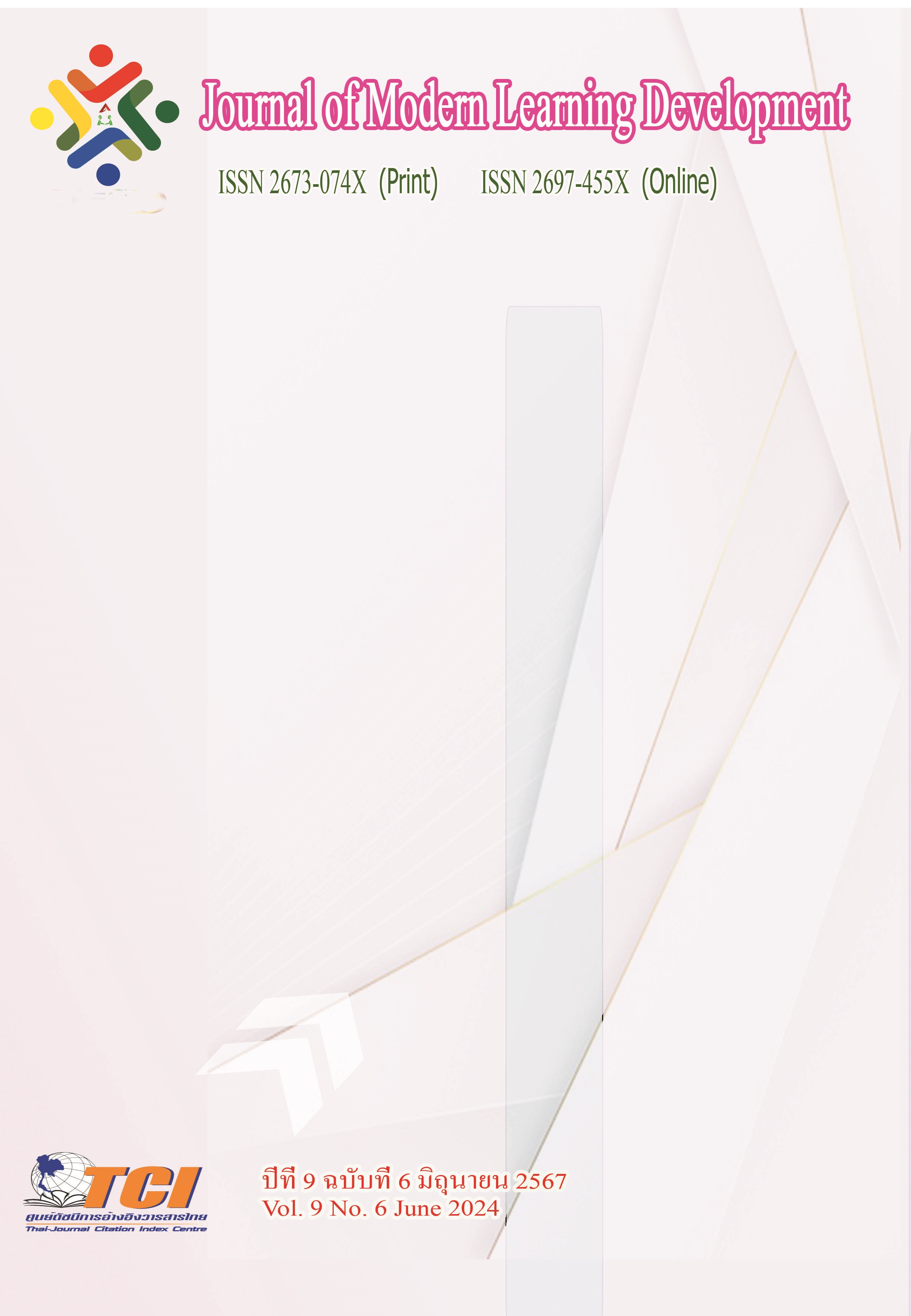โมเดลความสัมพันธ์เชิงสาเหตุของปัจจัยที่มีอิทธิพลต่อความตั้งใจเป็นผู้ประกอบการของนิสิตระดับปริญญาตรี มหาวิทยาลัยนเรศวร
Main Article Content
บทคัดย่อ
การวิจัยครั้งนี้มีวัตถุประสงค์เพื่อ 1) พัฒนาและตรวจสอบความสอดคล้องของโมเดลความสัมพันธ์เชิงสาเหตุของปัจจัยที่มีอิทธิพลต่อความตั้งใจเป็นผู้ประกอบการของนิสิตระดับปริญญาตรี มหาวิทยาลัยนเรศวรกับข้อมูลเชิงประจักษ์ 2) วิเคราะห์อิทธิพลของปัจจัยที่มีอิทธิพลเชิงสาเหตุต่อความตั้งใจเป็นผู้ประกอบการของนิสิตระดับปริญญาตรี มหาวิทยาลัยนเรศวร ผู้วิจัยใช้การวิจัยเชิงสาเหตุ (Causal Research) กับกลุ่มตัวอย่างนิสิตระดับปริญญาตรี จำนวน 350 คน ใช้การสุ่มตัวอย่างแบบหลายขั้นตอน เครื่องมือที่ใช้ในการวิจัย คือ แบบสอบถามแบบมาตรวัดประมาณค่า 5 ระดับ การวิเคราะห์ข้อมูลใช้สถิติเชิงพรรณนา และตรวจสอบความสอดคล้องของโมเดลด้วยการวิเคราะห์แบบจำลองสมการโครงสร้าง
ผลการวิจัยพบว่า
โมเดลการวัดมีค่าความเชื่อมั่นขององค์ประกอบอยู่ระหว่าง 0.73-0.95 และค่าความแปรปรวนเฉลี่ยขององค์ประกอบอยู่ระหว่าง 0.47-0.87 โมเดลสมการโครงสร้างมีความสอดคล้องกับข้อมูลเชิงประจักษ์ (X2= 71.197, df = 50, p-value = 0.026, CFI = 0.996, TLI = 0.992, RMSEA = 0.035, SRMR = 0.020, X2/df = 1.424) โดยพบว่า เจตคติต่อการเป็นผู้ประกอบการ การรับรู้ความสามารถในการเป็นผู้ประกอบการ การจัดการศึกษาเพื่อความเป็นผู้ประกอบการ และบรรทัดฐานทางสังคม มีอิทธิพลต่อความตั้งใจเป็นผู้ประกอบการของนิสิตระดับปริญญาตรี มหาวิทยาลัยนเรศวร ซึ่งการรับรู้ความสามารถในการเป็นผู้ประกอบการมีอิทธิพลสูงที่สุดโดยเป็นอิทธิพลทางตรง รองลงมา คือ การจัดการศึกษาเพื่อความเป็นผู้ประกอบการ มีอิทธิพลทั้งทางตรงและทางอ้อม และเจตคติต่อการเป็นผู้ประกอบการ มีอิทธิพลทางอ้อมผ่านทางการรับรู้ความสามารถในการเป็นผู้ประกอบการ และสุดท้ายบรรทัดฐานทางสังคม มีอิทธิพลทางอ้อมผ่านเจตคติต่อการเป็นผู้ประกอบการ การรับรู้ความสามารถในการเป็นผู้ประกอบการ
Article Details
เอกสารอ้างอิง
กองแผนงาน มหาวิทยาลัยนเรศวร. (2565). รายงานผลภาวะการมีงานทำของบัณฑิต 2554 – 2564. ออนไลน์. สืบค้นเมื่อ 4 มกราคม 2565. แหล่งที่มา: http://www.plan.nu.ac.th/?p=1229
คมกริช นันทะโรจพงศ์. (2561). พฤติกรรมการเป็นผู้ประกอบการของวัยรุ่นไทย: อิทธิพลของการรับรู้ความสามารถตนเองและการรับรู้การสนับสนุนทางสังคมต่อความตั้งใจในการเป็นผู้ประกอบการในบริบทวัฒนธรรมแบบรวมกลุ่ม. วารสารบริหารธุรกิจศรีนครินทรวิโรฒ. 9 (2), 44-59.
จริยา กอสุขทวีคูณ. (2561). การศึกษาแรงจูงใจและความตั้งใจในการเป็นผู้ประกอบการของนักศึกษาระดับอุดมศึกษาในประเทศไทย. วิทยานิพนธ์ปริญญาการจัดการมหาบัณฑิต. บัณฑิตวิทยาลัย: มหาวิทยาลัยกรุงเทพ.
ชมพูนุท ด้วงจันทร์. (2564). แบบจำลองโมเดลความตั้งใจเชิงสาเหตุการเป็นผู้ประกอบการของนักศึกษาระดับปริญญาตรี หลักสูตรบริหารธุรกิจ: กรณีศึกษา มหาวิทยาลัยสงขลานครินทร์. วารสารการจัดการธุรกิจ มหาวิทยาลัยบูรพา. 10 (2), 148-163.
นงลักษณ์ วิรัชชัย. (2538). ความสัมพันธ์โครงสร้างเชิงเส้น (LISREL) สถิติวิเคราะห์สำหรับการวิจัยทางสังคมศาสตร์และพฤติกรรมศาสตร์. กรุงเทพมหานคร: โรงพิมพ์จุฬาลงกรณ์มหาวิทยาลัย.
บุรทิน ขำภิรัฐ. (2548). การพัฒนาการตรวจสอบความตรง และความไม่แปรเปลี่ยนของโมเดลสมการโครงสร้างพหุระดับประสิทธิผลความเป็นคณบดี. จุฬาลงกรณ์มหาวิทยาลัย. กรุงเทพมหานคร.
พงษ์สันติ์ ตันหยง. (2564). ปัจจัยที่ส่งผลต่อความตั้งใจที่จะเป็นผู้ประกอบการของนักศึกษาปีที่ 4 สาขาวิชาการ จัดการทั่วไปมหาวิทยาลัยราชภัฏนครปฐม. Journal of Management Science Nakhon Pathom Rajabhat Universityใ 8 (2), 322-333.
พัทธนันท์ เรืองศรีมั่น. (2562). ปัจจัยที่ส่งผลต่อความตั้งใจที่จะเป็นผู้ประกอบการของนักศึกษาปริญญาโทวิทยาลัยการจัดการ มหาวิทยาลัยมหิดล. สารนิพนธ์ปริญญามหาบัณฑิต. วิทยาลัยการจัดการ. บัณฑิตวิทยาลัย: มหาวิทยาลัยมหิดล.
มนทกานต์ เมฆรา. (2546). ปัจจัยที่พยากรณ์ความตั้งใจที่จะเป็นผู้ประกอบการของนักศึกษา มหาวิทยาลัยเชียงใหม่. การค้นคว้าแบบอิสระปริญญาวิทยาศาสตรมหาบัณฑิต. สาขาวิชาจิตวิทยาอุตสาหกรรมและองค์การ. บัณฑิตวิทยาลัย: มหาวิทยาลัยเชียงใหม่.
มารยาท โยทองยศ และทรงวาด สุขเมืองมา. (2559). ปัจจัยที่มีอิทธิพลต่อความตั้งใจที่จะเป็นผู้ประกอบการของนักศึกษาปริญญาตรี: กรณีศึกษามหาวิทยาลัยกรุงเทพ. สุทธิปริทัศน์. 30 (95), 103-115.
วรุตม์ พิมพ์สอน. (2565). ความตั้งใจที่จะเป็นผู้ประกอบการธุรกิจด้านกีฬาของนักศึกษาปัจจุบัน และ/หรือ ศิษย์เก่าที่ศึกษาทางด้านวิทยาศาสตร์การกีฬา ในเขตกรุงเทพมหานครและปริมณฑล. สารนิพนธ์ปริญญาการจัดการมหาบัณฑิต. บัณฑิตวิทยาลัย: มหาวิทยาลัยมหิดล.
สำนักงานปลัดกระทรวงแรงงาน. (2564). การสำรวจภาวะการทำงานของประชากร ไตรมาสที่ 1 พ.ศ. 2564. (ออนไลน์). สืบค้นเมื่อ 4 มกราคม 2565. แหล่งที่มา: http://www.nso.go.th/sites/2014en /Survey/social/labour/LaborForce/2021/summary1_64.pdf
สำนักงานเลขาธิการสภาการศึกษา กระทรวงศึกษาธิการ. (2561). การจัดการศึกษาเพื่อพัฒนาความเป็นผู้ประกอบการ (Entrepreneurship Education). ออนไลน์. สืบค้นเมื่อ 4 มกราคม 2565. แหล่งที่มา: http://backoffice.onec.go.th/uploads/Book/1575-file.pdf
สำนักงานสถิติแห่งชาติ. (2565). อัตราการว่างงานเป็นรายไตรมาส พ.ศ. 2555 - 2566. ออนไลน์. สืบค้นเมื่อ 4 มกราคม 2565. แหล่งที่มา: http://statbbi.nso.go.th/staticreport/page/sector/th/02.aspx
อนงค์ รุ่งสุข. (2559). ปัจจัยที่มีผลต่อความตั้งใจที่จะเป็นผู้ประกอบการของนักศึกษาคณะบริหารธุรกิจ มหาวิทยาลัยเทคโนโลยีราชมงคลรัตนโกสินทร์. วิทยานิพนธ์ปริญญาบริหารธุรกิจมหาบัณฑิต. บัณฑิตวิทยาลัย: มหาวิทยาลัยเทคโนโลยีราชมงคลรัตนโกสินทร์
อมินดารา อริยธาดา. (2565). รูปแบบความ สัมพันธ์เชิงสาเหตุด้านคุณลักษณะทางจิตและสภาพแวดล้อมทางการศึกษาที่ส่งผลต่อ พฤติกรรมการมุ่งเน้นการเป็นผู้ประกอบการโดยส่งผ่านความตั้งใจที่จะเป็นผู้ประกอบการของ นักศึกษาสาขาผู้ประกอบการ. วารสารการวัดผลการศึกษา. 39 (105), 273-283.
อิศรัฏฐ์ รินไธสง. (2565). การวิเคราะห์โมเดลสมการโครงสร้างสำหรับการวิจัยทางพฤติกรรมศาสตร์และสังคมศาสตร์. (พิมพ์ครั้งที่ 3). กรุงเทพมหานคร: นีโอพ้อยท์ (1995) จำกัด.
Ajzen, I. (1991). The theory of planned behavior. Organizational Behavior and Human Decision Processes, 50 (2), 179-211.
Eyel, C. Ş., & Durmaz, İ. B. V. (2019). Entrepreneurial intentions of Generation-Z: Compare of social sciences and natural sciences undergraduate students at Bahçeşehir university. Procedia Computer Science, 158, 861-868.
González-Serrano, M. H., González García, R. J., & Pérez Campos, C. (2018). Entrepreneurial and intrapreneurial intentions of sports science students: what are their determinant variables?. Journal of Physical Education and Sport, 18 (3), 1363-1372.
Katz, J., & Gartner, W. B. (1988). Properties of Emerging Organizations, 13(3), 429–441.
Kim-Soon, N., Ahmad, A. R., & Ibrahim, N. N. (2018). Understanding the motivation that shapes entrepreneurship career intention. Entrepreneurship: Development Tendencies and Empirical Approach, 291.
Linan, F. & Chen, Y. W. (2009). Development and Cross-cultural Application of A Specific Instrument to Measure Entrepreneurial Intentions. Entrepreneurship Theory and Practice, 33(3), 593-617.
Naia, A., Baptista, R., Biscaia, R., Januário, C., & Trigo, V. (2017). Entrepreneurial intentions of sport sciences students and theory of planned behavior. Motriz: Revista de Educaçço Fçsica, 23, 14-21.
Passoni, D., & Glavam, R. B. (2018). Entrepreneurial intention and the effects of entrepreneurial education: Differences among management, engineering, and accounting students. International Journal of Innovation Science, 10 (1), 92-107.
Report, I. F. (2022). World Employment and Social Outlook Trends. Retrieved from https://www.ilo.org/global/research/global-reports/weso/trends2022/WCMS_834081/l ang--en/index.htm. Accessed an 26 March 2023.
Schumacker, R. E. & Lomax, R. G., (2010). A Beginner’s Guide to Structural Equation Modeling. (3rded.). New Jersey: Lawrence Erlbaum Associates.
UNCTAD. (2018). Policy Guide on Youth Entrepreneurship. Retrieved from https://www.itd.or.th/wp-content/uploads/2018/09/Policy-Brief-61_Youth2.pdf
Yun, C. (2010). Does entrepreneurship education matter students' entrepreneurial intention? a Chinese perspective. Paper presented at the 2nd International Conference on Information Science and Engineering.


